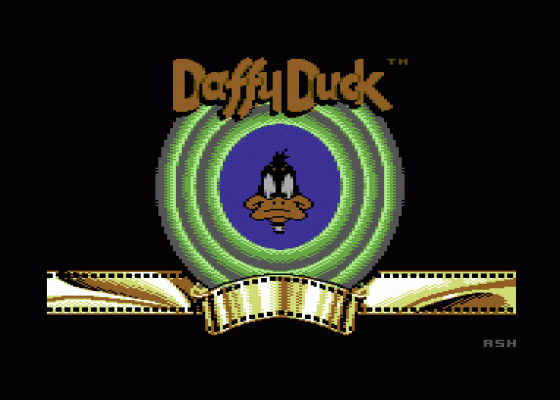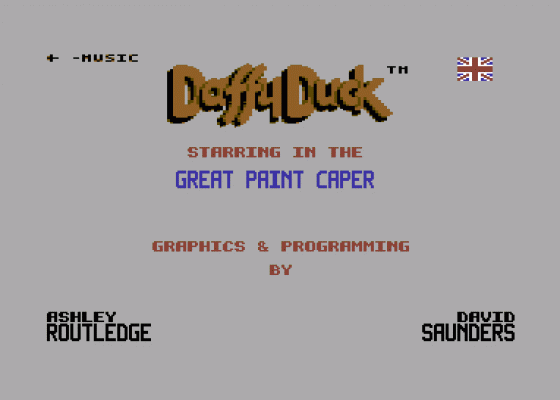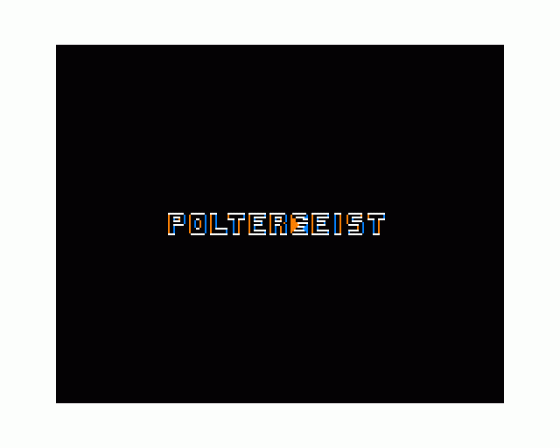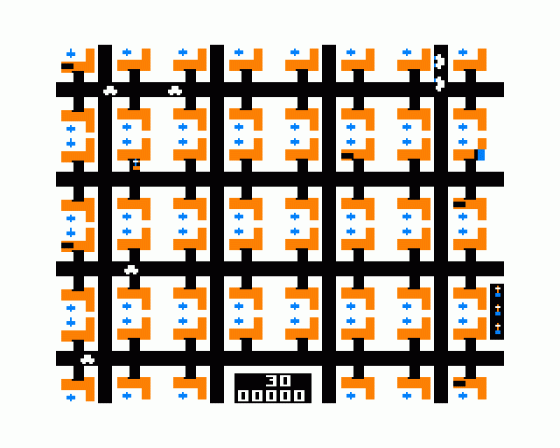
Micro Mart
 1st October 2015
1st October 2015
Categories: Review: Software
Author: Dave E
Publisher: Heyley
Machine: Acorn Electron
Published in Micro Mart #1382: October 2015 Special
Retroland buzzes as long-thought Daffy Duck finally gets released, leading Dave Edwards to examine just why finding an unreleased masterpiece seems to garner even more respect than developing and writing your own new one...
In 2012, and if I recollect correctly, Sweden's Loreen won Eurovision singing "Euphoria... From now until the end of time, one day Daffy Duck will be mine, and we'll go oh oh oh..." At least, I think that's what she was singing. Maybe I just heard it that way.
Daffy Duck (In The Great Paper Caper) was, and is, of course, the holy grail of unpublished Commodore 64 games, originally written by Ashley Routledge and David Saunders and due to be published by Hi-Tec Software in the early Nineties. But, having sent previews of the game out to the leading Commodore magazines, Hi-Tec went under, possibly as little as a few days before
Daffy Duck was to hit the shelves. Daffy quickly became one of the most sought after unreleased games ever and, over the next eighteen years, the guys over at www.gamesthatwerent.com made almost herculean efforts to find a copy of it. All of them came to nought until 3rd September 2015. On this date came the news that Daffy Duck had finally been preserved. This news created a euphoria that I have seldom seen in the retro computing world. So this month, Retro Round Up is paying tribute not to the usual crop of brand new releases, but to games like Daffy, brand new "unreleased" releases. Come with us, and prepare to be amazed...
I've regularly overheard conversations regarding the search for Daffy at retro events. It had its own urban legend in the form of a tale that a box of 250 mastered Daffy cassettes had in fact made it out of the door before Hi-Tec's collapse. Finding a single copy of Daffy was therefore a thought that was always lurking in the back of all of our minds; every box of "new old stock" in every dusty warehouse held an extremely remote promise that, just maybe, Daffy might be inside it.
There was more too - fake press releases (every April 1st) would raise our hopes that it had been found, only to dash them a few seconds later. Occasionally, an eBay auction - always fake - for Daffy would also appear, to exactly the same effect. GTW tracked down the original developers, but they didn't have the game. Ex-employees of the magazines that reviewed it were traced, in case there was the slightest possibility that they had "liberated" the review copy from the office. No-one had. As Hi-Tec had offered Daffy at one stage as a competition prize, GTW even traced the winners of Hi-Tec's competitions - eighteen years later! - to see if they had received it. Now that is true dedication to a cause. But it led precisely nowhere. Frustratingly, the game that Zzap64 had awarded a whopping 94% to at the time remained lost. Until now. And, the game itself is good. In fact, I doubt C64 owners have been playing a lot else over the past month.
Now I don't want to labour over how the game was finally unearthed here because it's truly an epic story best expressed by the GTW boys themselves. The great news is that you can download it 100% free from the GTW web site. The not-no-great news is that it did ultimately get 'resurrected' from various old discs rather than by being found complete post-compilation with an inlay card. Importantly, that means there are no instructions for you to read. As the game is a platformer, you might initially think you wouldn't need much in the way of instruction anyway. However, leaping the Warner Brothers' "You're despicable" duck from platform to platform is only one element of the game, with it being something more from the graphic adventure stable than pure platform fun.
You start the game in The Studios with a very cartoony-looking Daffy sprite and a screen that scrolls with you as you move. Each screen features patrolling nasties and rooms to pop in and out of. Curiously, you can speak to certain characters on this level, such as Marc Antony who will tell you "I'm looking for the lunchbox!!" in response to almost everything you might choose to say. You can also walk left and right, picking up and dropping the objects that you find. If you find you cannot make progress on a certain screen, it is invariably because you haven't found the object you need to do so. When you do have that object, it is automatically used to solve the problem. For example, a plank of wood will nail itself to the ladder that is missing it; you don't need to select it from your inventory manually.
This first level is not particularly difficult and, once I'd stopped running away from all the characters who I'd wrongly figured were fatal to the touch, and started talking to them instead, I completed it and progressed to The Sewers. The disc version loads this in in about 10 seconds and this is a much more challenging, and varied, series of interconnecting mazes - as well as ladders and platforms!
Daffy Duck is clearly a highly polished product; the graphics are defined to the degree that the game would seem competent on a much more powerful machine than the Commodore 64. The control of Daffy, apart from a few quirks with the ladder ascending and descending, is also second-to-none. Music is loud and bouncy too. Plus it has seven different themed levels, and all are a challenge to solve.
Nevertheless, clearly a lot of time has passed since Zzap64 was bowled over by Daffy. To me, some aspects of it seem a little clumsy. For example, the conversations you can have with the patrolling characters are a bit odd, even if they do their job in 'progressing' the game itself. Plus, Daffy Duck suffers from what I think of as the "licenced platform game cop out" effect. That is, that seemingly every game that features a famous cartoon character, be it Bart Simpson, Garfield or Scooby-Doo, seems to be built with the same Platform Game Designer tools with the main sprite changed to the cartoon character of the title. They all feel samey to me, and in the case of Daffy Duck, there's something that reminds me of Garfield: The Search For Pooky (Game Boy Advance) about it.
Whilst Daffy Duck represents one of the most epic of struggles, Poltergeist for the Dragon 32 is a less dramatic but nonetheless interesting, find recently archived by DCC (www.dragon-it.co.uk).
As with many "newly discovered" Dragon 32 games, Poltergeist is actually a conversion of a Tandy Color Computer (CoCo for short) game, in turn an official licence for the original Steven Spielberg film. Having been originally released only on NTSC ROM Cartridge for the American CoCo market, most of you reading this will never have heard of it. However, with the original movie having recently been rebooted for 2015, most of you will probably be familiar with the plot. Essentially, an army of restless spirits abducts Carol Anne, the youngest child of the Freeling family, by seizing her through her bedroom closet. She is then 'somewhere' in the house itself, able to communicate via the static of the family's un-tuned television set, until her parents take the decision to cross into the 'somewhere' themselves in the hope of rescuing her.
The game is divided into three stages. In the first, you must collect up the equipment needed to enter the 'somewhere' and then locate the Freeling household. In the second, you must climb the stairs avoiding the spirits that try to stop you. And finally in the third, you must enter the 'somewhere' and blast the poltergeist with a machine gun. This last stage is about as big a departure from the movie as you can imagine, and fighting ghosts with machine guns really seems a very dubious strategy indeed.
Each stage is like a small 5K game in itself, not particularly challenging but varied enough to retain interest. In stage one, you are placed on an overhead map and you must run around avoiding the cars that drive up and down the totally straight roads to collect up the necessary items. The next stage is viewed from overhead too, and you control a pair of feet which step up and down the stairs on your command. This requires more skill than you might think - as you must first lure the spirit toward you and then sidestep around it. The final stage is a psychedelic mishmash in which the grinning face of the poltergeist flits about, often agonisingly out of range. If you fail any stage, you are sent all the way back to the very beginning of stage one again.
Originally released for the CoCo in 1982, Poltergeist feels extremely dated some 34 years later. I've chosen to review it for purely topical reasons this issue, but many more games which originally didn't make it to the Dragon have now been byte-by-byte converted to that machine, so if you've ever dreamed of seeing Dragon versions of Pooyan or Paperboy, these have also quite recently also become available from the same place (www.dragon-it.co.uk).
Finding, preserving and/or converting old retro games is a struggle. Browse archive sites such as World Of Spectrum or Stairway To Hell and it's certainly obvious what they've got, but it's not obvious what they're missing. So the usual way of working this out is to browse through old magazines for your machine of choice. Had the progress of Daffy Duck not appeared in news stories, it would never have ignited the interest of the GTW web site, for example.
In relation to the BBC Micro and Acorn Electron however, there was, until very recently, a whole library of games that were mentioned in the press, but seemed unlikely to ever be recovered. This library was the Heyley Software range of text adventures. These adventures had been written by Howard Roberts and Tony Heap, available by mail-order only in the late Eighties, and were distributed by an outfit called ACP/Pres. Incredibly, ACP/Pres advertised their existence by way of a small ad in the pages of Electron User stating badly "Adventure Games On Disc. £7.95 each," meaning it was at least a few years until anyone even identified their actual titles, let alone set about the arduous task of tracing them.
Dreamtime was the first of these to be recovered, and was found in a box of random Acorn Electron gear several years ago. Having completely escaped review in its day, all that was known about it was that control would be by the usual GO NORTH, GET FLASK commands common to most text adventures. Very pleasingly however, the version recovered was totally complete with full instructions and hints on play. If you're considering playing it, then you will definitely need to refer to them. Dreamtime is a more peculiar adventure than many, beginning when you nod off to sleep and ending only when you manage to solve all the puzzles presented in your dreams.
You are initially placed in a hotel and quickly discover an elevator links all the disparate elements of this adventure together, flinging you not only into different dreams but even into the bodies of different people. The elevator is practically the only constant in Dreamtime in fact and, because you have absolutely no idea what the goal is of any of the characters you briefly become, it's almost impossible to work out what you should do and why. The word that therefore springs immediately to mind to describe Dreamtime is "plotless" and it is one recently unearthed game that should be avoided at all costs unless you really want a text adventure with no real beginning, middle or end.
As we've seen in previous columns, retro game "writing" is something that more and more people are involved in, with new Spectrum releases arriving so quickly that I can now barely keep up. Retro game "preservation" is an altogether different beast. Daffy, Poltergeist and Dreamtime are three different games discovered in three wholly different ways; Daffy was resurrected from development discs, Poltergeist was disassembled from a cartridge then re-assembled to a different machine, and Dreamtime was discovered in a box. Yet, no matter by what means a brand new unreleased retro game explodes into life, it comes coupled with a "duty" attached.
This duty is to somehow finally give the game to the world. And what can be more fascinating than the game itself are those back-stories that lead up to its final release, and the domino effect that releasing it can have. In a small article like this, there isn't so much time to dwell upon these but consider all of the following unexpected outcomes of those who ultimately did take on-board such a duty.
Daffy Duck was known about because of the Zzap64 spread. Bugs Bunny: Private Eye was not known about. In the search to recover Daffy Duck, this additional game was recovered too and, as you can imagine, it is up to the same standard. The quest to find Daffy, even if Daffy itself had never been found, directly resulted in the release of this "new" Commodore 64 game.
Poltergeist was, for many years, a game known to exist on the Tandy CoCo. As CoCo games, even in the Eighties, could be cajoled into working on the Dragon with a bit of peeking and poking, there were often 'unofficial' conversions of them doing the rounds in Dragon User's small ads pages. Hence a Dragon version of the game was 'suspected' to exist. In the event, a request for Poltergeist in the forums of the Dragon Archive led to whole swathes of these 'unofficial conversions' being released.
Dreamtime was, for a long time, the only Heyley adventure recovered. It caught the attention of one Howard Roberts, who helped to write some other four Heyley adventures and who reported that all five of them had been lost forever after a thief broke into his car and stole the master discs. In turn, this led to a gentleman who used to work for ACP/Pres remembering that he liberated a few 3.5" discs from its offices and that the Heyley discs were amongst them. Last year, as a direct result of forum discussions on the back of the initial find, the entire catalogue of Heyley adventures (Pirate's Peril, Stranded, The Taroda Scheme and The Ultimate Prize) were made available. These adventures are a lot less random than Dreamtime.
It is also amazing how the retro community unites around such finds. If the version of the game that is found is copy-protected, someone will step forward to hack past the protection. If there are licensing issues, or some doubt as to whether the original author would want the game released, someone will find him and get his approval. And, when an 'unreleased' game finally makes it to cyberspace, there are celebrations of the like that simply do not meet genuinely newly-written games. Indeed, one person may spend years writing a new game on a retro format and be greeted with indifference whilst another recovers Gemini's Alphabet Chase and gets the equivalent of a standing ovation. Strange world indeed.
Last month, I took a look at the ZX Vega, which comes pre-installed with 1,000 Spectrum games and said I considered it an essential purchase despite the fact the majority of its games were new, rather than classic releases. Having now played with it for a lot longer however, I have some provisos to add to this.
Firstly, it draws its power via a USB port; the idea is that you plug the composite cables into your TV and the USB port too. If your television does not have a USB port, that leaves you having to find the power elsewhere. I can imagine this makes for some quite fiddly set-ups - a regular three-pin plug socket would have been much more convenient for most people.
Secondly, the picture quality emitted by the Vega is poor. Graphics appear speckled or with "noise" around them. The user manual indicates that this is more pronounced on some televisions than others, hence whether you are going to be forever squinting at the screen is a £100 gamble.
Thirdly, over 250 of the games it includes are text adventures, which must be played via a baffling "virtual keyboard" that operates like a mobile phone without predictive text. This is absolute rubbish and I cannot imagine anyone persevering with such an unfriendly input device.
And finally, the Vega boasts that you can transfer all the games you remember from your youth to it. That's true enough, but it rather inconveniently forgets to mention that they won't work without the keys being "mapped" to the Vega's D-pad system. So you can transfer them, but you can't play them without some serious jiggery-pokery with the code for the game in question. That's a pretty big omission.
The ZX Vega forums were, until very recently, filled with allegations that these drawbacks (and some others) could, and should, have been remedied prior to release. At time of writing however, these forums, controlled by the ZX Vega team, have mysteriously disappeared. If this has been done to stifle such criticism, then that's rather unsettling too.
Now I personally can live with almost all of the Vega's flaws - the sheer volume of great games on it (even if they come without instructions) is incredible. But the killer is that poor quality video. As soon as customers realise that they will get a far clearer, sharper picture using an emulator on their PC, I suspect a lot of them will simply want their £100 back.
Introduction
Daffy Duck (Commodore 64)
Poltergeist (Dragon 32)
Dreamtime (BBC/Electron)
The Treasure Trail
Soapbox - The ZX Vega
Other Reviews Of Dreamtime For The Acorn Electron
Dreamtime (Heyley)
A review by Pendragon (Electron User)




















